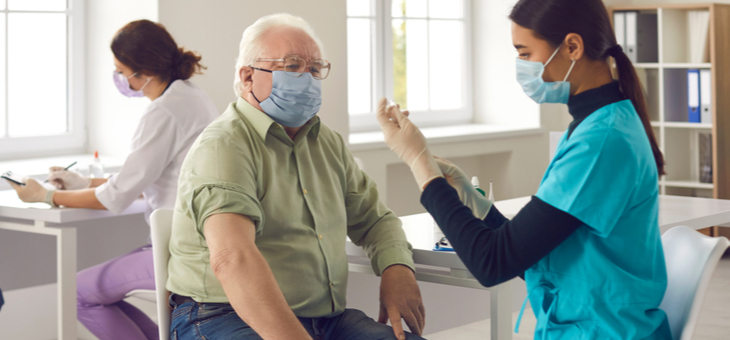How should you prepare for a COVID-19 vaccination?
Nine reports that it is a good idea to exercise in the lead-up to your jab.
“Past research on vaccinations, such as influenza and HPV, has shown that exercise – even training shortly before an injection – can both boost their effectiveness and reduce the risk of side-effects.”
University of Sydney associate professor of exercise science Kate Edwards told Nine the same should apply for the COVID-19 vaccination.
“We see that regular exercise over the course of weeks or months makes vaccine responses stronger and that likely then means you are more protected from the disease,” says Assoc. Prof. Edwards.
First, exercise sends immune cells into the blood’s circulation. “This kills infected cells and produces antibodies to destroy viral and bacterial antigens.”
Next, exercise makes muscles release “signalling molecules, called myokines, that help put our body’s defences on high alert”.
Rob Newton, professor of exercise medicine at Edith Cowan University, says “exercise has no downsides”.
“It gives benefits regardless and the evidence is so strong in a range of other vaccines.”
A US study, published in the British Journal of Sports Medicine, examined almost 50,000 patients and concluded that aside from old age or a past organ transplant, physical inactivity was the biggest risk factor for severe symptoms, Nine reports.
The US Centers for Disease Control and Prevention says “gently using and exercising the affected arm can actually help reduce the discomfort” from the vaccination site.
However, Dr Blanka Kaplan, a specialist in adult and paediatric allergy and immunology, says to avoid vigorous exercise or hot showers two hours before and after your vaccination as they can trigger allergic reactions.
Candice Opperman, a fitness instructor in New York City and study volunteer for the AstraZeneca vaccine trial, says to avoid intense fitness activities soon after receiving the vaccine.
Read more: Vaccination no guarantee of open borders
Vaccination hints
Learn about your vaccine and be prepared
Before your vaccination, find out as much as you can about the substance you will be administered and possible side-effects from health.gov.au and your state authorities such as coronavirus.vic.gov.au, health.nsw.gov.au and qld.gov.au/health.
Go prepared with questions and have all the documentation you require, whether that be identification or medical records. Check what you need when making your booking. Get an idea of how long the process will take. If you have any history of allergic responses, you may be kept under observation for half an hour rather than 15 minutes. Knowing the situation at your GP or mass vaccination site will save undue waiting.
Know your medical history
Inform your doctor or the vaccinator if you’ve experienced allergic reactions to previous vaccines. If you react badly to getting shots, get light-headed or faint, let them know. This reaction may be due to anxiety, rather than the vaccine.
Try to leave two weeks between your COVID jab and any other vaccinations or avoidable medical procedures.
Read more: Using your phone to prove your vaccination status
Avoid alcohol and other drugs and drink plenty of water
Dr Kaplan says that in some circumstances, alcohol can “accelerate” allergic reactions. “Since we do not yet know enough about the influence of alcohol on allergic reactions to the COVID-19 vaccines, I recommend avoiding drinking alcohol for 24 hours before and after your vaccination,” she says.
Though common painkillers such as paracetamol and ibuprofen are not proven to interfere with immune response to vaccinations, their effect on allergic responses is also unknown, so it is best not take them before the shot.
Avoid unnecessary vitamin supplements or probiotics. Dr Kaplan recommends “getting enough sleep, staying physically active and well hydrated” and eating well to enable the immune system to do its best. If your appointment is near a mealtime, eat beforehand and drink water. Make sure you aren’t hungry or thirsty when you arrive.
Wear vaccine-chic
You’ll get your shot in the deltoid muscle located in your upper arm, so wear a shirt that can be rolled up easily. If you’re attending a mass vaccination site and it’s cold, wear layers that are easy to remove, with the bottom layer a sleeveless shirt or with easy to roll up sleeves.
Arrange a day off
Dr Tara Vijayan, an infectious disease specialist, suggests you take the day off after your vaccination. You may have a fever, which is a positive, as it shows the immune system is responding to the vaccine. And Dr Vijayan is speaking from experience: She was dosed in the morning, then went straight back to work. “I was wiped out that evening,” she says.
Do you know enough about how COVID-19 vaccinations will work?
Read more: Elderly should get vaccinated first
If you enjoy our content, don’t keep it to yourself. Share our free eNews with your friends and encourage them to sign up.

